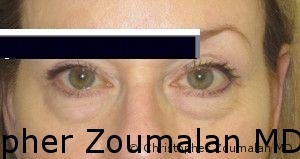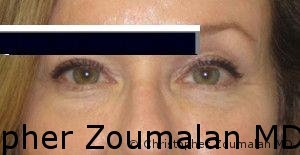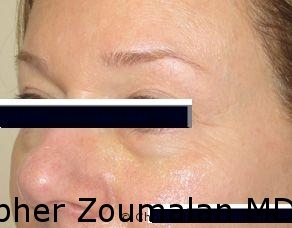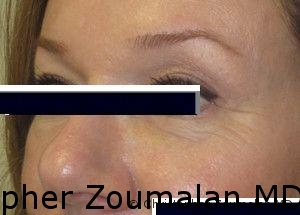This particular patien below came to see me for the bags underneath her lids. On exam, she has herniated lower lid fat pads which are resulting in her tired apperance. Prior to the advent of eyelid filler treatments, she would traditionally have required blepharoplasty surgery to rejuvenate her lower lids. But we now know that two things occur with the eyelid aging process:
1) herniation of lower lid fat pockets (bags under lids).
2) and loss of volume below the fat pads resulting in tear trough hollowing (deformity) and in the midface area (which is the area between the eyelid and the nostrils).
In her case, we planned to first address the loss of volume (#2 above) in her tear troughs and midface area using hyaluronic acid fillers (ie Restylane and Juvederm). This was done in a stepwise fashion such that a further filler augmentation was performed two weeks after her first procedure. I don’t like to place too much product at one setting; I rather reassess after two weeks to make sure the patient tolerates the filler material well.

Pre treatment photos show herniated lower lid fat pads (bags under lids). But she also has hollowing of her lower rim and loss of midface volume, both of which worsen her lower lid appearance.

Post filler treatment using hyaluronic acid fillers (ie Restylane and Juvederm) shows a dramatic improvement in her lower lid appearance. Although the fat pockets are still present, re-establishing her “normal” lower lid and midface volume allowed for the fat pockets to be less visible.

Pre treatment side view shows the extent of the tear trough deformity (hollowing) and midface volume loss.

Pre treatment side view shows the extent of the tear trough deformity (hollowing) and midface volume loss.
So the answer is that this patient ONLY underwent filler injections to her lower orbital rim and midface volume and did NOT have surgery.

